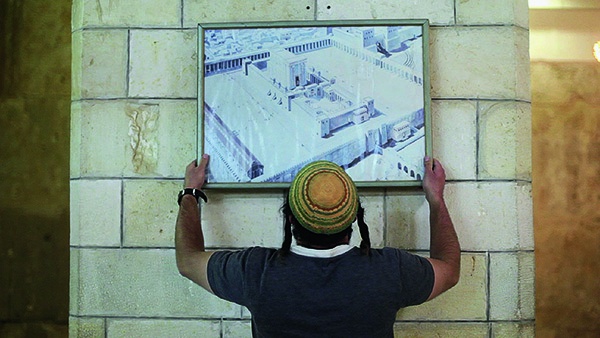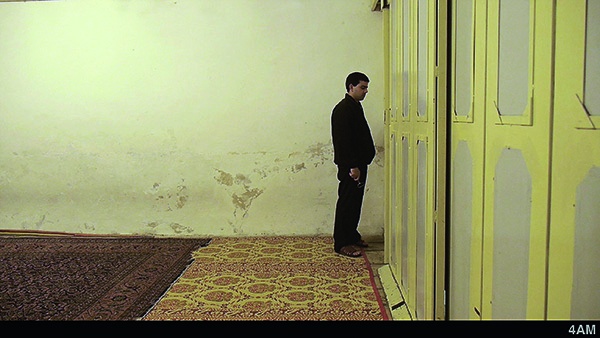CRITIQUE, AND CRITIQUE OF THE CRITIQUE How the BDS Debate Leads to a Dead End

Nira Pereg, „ABRAHAM ABRAHAM SARAH SARAH“, 2015, Videostill
“You grew up in a Muslim home. How did you deal with anti-Semitism in the family?” I still remember this live interview with a radio station very well. It is often in ways like this that a person read as Muslim is confronted with the assumption of having grown up with anti-Semitic prejudices. I cannot meet his expectation – neither in my family nor among my circle of Muslim friends did I encounter open Jew-hate during my youth. My first encounter with a milieu in which anti-Semitism was practically unquestioned as “common sense” was during my work for the UN, in the Office of the Commissioner for Human Rights. At the very start I was told that “what Israel is doing with Palestinians is exactly what the Nazis did with the Jews.” In discussions with colleagues from Belgium, Morocco, Italy, and Saudi Arabia, Israel was considered as evil incarnate. Those Boycott, Divestment and Sanctions supporters who only boycott Israelis rely on precisely that double standard I experienced in Geneva.
Anyone who believes the problem is only to be found in Geneva or at the UN is mistaken. Here in Germany too, I have encountered under the BDS label the most bizarre justifications for anti-Semitic behaviors. I spoke recently with a Jewish-American musician who was asked by a colleague whether he also held Israeli citizenship. When he answered in the negative, the colleague replied “That’s good. Otherwise we wouldn’t have been able to go on stage together.” The same colleague refused a bouquet of flowers an Israeli had wanted to give to all the musicians at the close of a concert. By this point it becomes clear that this is not just about boycotting products. With BDS, we are dealing with a totalitarian ideology in which exclusion is not an instrument but rather an inherent principle. It is macabre that the very sympathizers of BDS present themselves as advocates of freedom of opinion and plurality.
The recent discussion about the invitation of the historian Achille Mbembe to the since-cancelled Ruhrtriennale is paradigmatic of the BDS debate, as here too anti-BDS critics protesting his invitation have been accused of seeking to restrict freedom of opinion while BDS sympathizers profess to advocate an open and non-coercive discussion culture. The catch is that the culture of discussion is to be conducted without Israeli voices, per BDS logic. In 2018, Mbembe himself asked the South African university in which he teaches to disinvite the Israeli psychologist and peace activist Shifra Sagy from a conference. Not due to her intellectual positions – merely because of her citizenship. The question may well be asked how seriously Mbembe’s indignation and injury are to be taken. Ultimately, the logic of disinvitation applied to him was the same as that he himself practiced. In the discussion surrounding Mbembe, the traditional opponents involved in the BDS debate faced off against each other: critics of Mbembe on one side, critics of the critics on the other. It is astonishing how few of his defenders addressed his own actions in the disinvitation of Sagy.

Nira Pereg, „ISHMAEL“, 2015, Videostill
However, totalitarian positions are also increasing in BDS-critical camps. Those who do not expressly distance themselves from BDS and those who do not join calls to disinvite BDS are automatically made into the enemy. We are seeing that it is not only about calls to disinvite BDS supporters but also “BDS understanders,” “BDS defenders,” and “BDS trivializers.” Situations thus repeatedly arise in which cultural and educational institutions become unsettled, such as when we at the Anne Frank Educational Center invited, among others, the journalist Daniel Bax to a podium discussion on the Middle East conflict. Bax takes the position that BDS is not anti-Semitic, but he himself does not support the campaign. We had not expected the wave of indignation that emerged prior to the event. The pressure on our institution intensified when the Anti-Semitism Commissioner of the State of Hesse demanded Bax be disinvited – with the argument that he downplays the seriousness of BDS. The Simon Wiesenthal Center also joined these calls and polemically declared that the Educational Center should remove “Anne Frank” from its name.
As someone who is personally connected to many Israelis and Palestinians, it is clear that BDS is not part of the solution to the Middle East conflict, but rather part of the problem. Dialogue projects between Palestinians and Israelis striving for exactly the peace that BDS claims to be about are what suffer most from the boycott. Even left-wing Israeli intellectuals involved in the peace movement and who already face huge challenges in Israel under Benjamin Netanyahu – like Shifra Sagy – are boycotted at universities in the US, the UK, and South Africa. Likewise, the Netanyahu government suffers no setbacks as a result of BDS, and can in fact always use BDS as proof of how isolated Israel is, thus drawing ever more frightened people onto the government’s side. Netanyahu and BDS need each other, so to speak. It is not only Netanyahu but also the Islamist Hamas regime in the Gaza Strip that receives indirect support from BDS. Since April 9, 2020, the Palestinian journalist and peace activist Rami Aman has been imprisoned. His “crime” is having participated in a Zoom meeting with Israeli peace activists. Hamas was informed by a Palestinian BDS activist who was seeking to prevent any kind of contact with Israelis.
Given that BDS is now being firmly rejected, it is not possible to easily dodge the question of what we in Europe can (and even must) contribute to peaceful resolution of the Middle East conflict. Israel’s Nation-State Basic Law and the Netanyahu government’s plans to annex much of the West Bank, alongside the human rights situation and corruption in the Fatah and Hamas governments, show that peace is becoming ever more remote. The important question is: How can the peaceful forces on both sides – Israeli and Palestinian – be supported? There is no simple answer to this question. Particularly not in times when populism, chauvinism, and nationalism are on the rise again worldwide. A desirable first step would be if local organizations for solidarity with Israel and with Palestine were able to work together. Not in support of governments, but of people there who need our solidarity. Brave people like Shifra Sagy and Rami Aman.
Translation: Matthew James Scown
